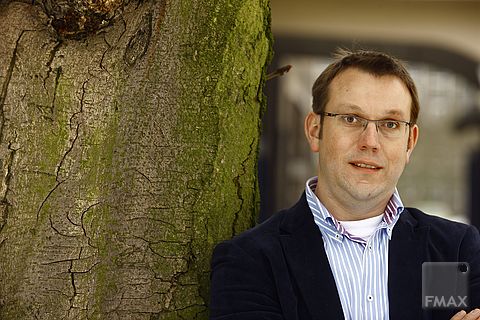The new MSc programme, industrial ecology, was recently accredited, granting it official status from September 2010. But what is this new scientific discipline all about?
In a recent article the author Thomas Homer-Dixon heralded ecology as ‘the newest science’, which will take the place of physics in the 21st century as the master science that defines the way people look at the world. Physics has led to the dominance of the mechanistic worldview, which has gradually lost its force and appeal as we are continually confronted by complex, non-linear systems in ecology and economics. Think of collapsed fish stocks, extinction of species and the economic crisis. Instead, Homer-Dixon argues, we need science that can handle the unpredictable dynamics of living systems and an outlook that puts a premium on prudency and resilience. That’s why ecology is his best bet for the 21st century.
The term industrial ecology sounds like an oxymoron. A cynic would say that for the last three centuries industry has been systematically exploiting the natural world, depleting its reserves and polluting the environment like there was no tomorrow. So how ecological can it get?
The turning point is generally pinpointed as being an article,
entitled ‘Strategies for Manufacturing’, written by Robert Frosch and Nicholas Gallopoulos and published in 1989 in the popular science magazine, Scientific American, in which the authors suggested the need for an industrial ecosystem in which ‘the use of energies and materials is optimised, wastes and pollution is minimised, and there is an economically viable role for every product of the manufacturing process’. Call it cradle-to-cradle plus energy efficiency. The article itself was probably a reaction to the 1987 Brundtland report, ‘Our common future’.
The movement inspired people from the environmental institute at Leiden University to set up a new department in 1999. Around the same time, dr. Saul Lemkowitz and dr. Gijsbert Korevaar, at the TU Delft faculty of Applied Sciences, set up the subject industrial ecology on the basis of the existing module chemistry & society for about fifty students per year. In 2004, the first ten students entered into the two-year MSc track industrial ecology, which was recently accredited as an independent, inter-university MSc programme by the universities of Leiden and Delft. In the following years, the numbers of students enrolled doubled, with two thirds of them being males and another one third coming from abroad, with their provenances ranging from Egypt and Sweden to the United States, Greece and China. “It’s a pity we got so few students from the TU”, says Korevaar, who is programme director of the industrial ecology MSc programme. “In anticipation of the official accreditation, we’ve been reticent in our advertising, but we can change that now.”
industrial ecology is necessarily a multidisciplinary study. It has its roots in environmental studies (Leiden University), in technology and design (TU Delft) and in transition management (Technology, Policy and Management at TU Delft or Erasmus University Rotterdam). Industrial ecology focuses on the flows of material and energy in products and processes, aiming to make them more compatible with the way natural ecosystems function.
The MSc thesis by Chris Davis on the environmental aspects of biomass-fired power plants embodies all three scientific aspects and thus functions as a showpiece for this new MSc study. Davis performed life cycle analysis (LCA) on the use of biomass for electricity plants; however, whereas normally LCA is performed on static processes, Davis applied the analysis on variable systems, which were the outcome of choices made in response to varying circumstances (a technique called agent based modelling). This enabled him to calculate the environmental consequences of fuel policies. Davis, for example, discovered that the introduction of a CO2-tax results in much greater technological change and CO2 reduction than can be achieved through decision making.
For a long time, resources have been cheap and plentiful, allowing industry to pursue a once through and dispose policy. According to Jonathan Krones (MIT), we’re now witnessing the first modest material loops and energy cascades in energy, emerging under the pressure of scarcity. Still, we are a long way from the ideal of total resource conservation. Whether industrial ecology will be the pivotal science of the 21st century or other disciplines will absorb its principles into their own mainstream priorities is hard to tell. What does seem certain is that ecology can no longer be denied.
Onderzoeksinstituut ITS van de Radboud Universiteit Nijmegen rapporteerde vorig jaar over de irritaties van docenten. Op een schaal van 1 (helemaal niet irritant) tot 10 (zeer irritant) gaven de 161 bevraagde hbo-docenten gemiddeld een 4,5 – een ‘matige irritatiegraad’ volgens de onderzoekers. De regels voor het inroosteren van lessen, het reserveren van werkplekken en de uitvoering van de accreditatie zijn vaak een bron van ergernis.
Wo-docenten noteerden een irritatiegraad van 4,8. Zij vinden vooral de regels rond tijdelijke contracten vervelend, maar ergeren zich ook aan de urenregistratie en de publicatiedruk. Zowel in het wo als het hbo wordt gemopperd over het aanvragen van ondersteuning en de invoering van onderwijsvernieuwing. Voor docenten is het niet altijd duidelijk wat verandert, waarom het verandert, en wat precies van hen wordt verwacht.
Uit de gesprekken met het onderwijsveld blijkt dat ‘regeldruk’ hoog op de agenda staat. Het ministerie en de sectoren werken samen om de kwaliteit van het management te verbeteren. Ook worden de systemen voor toezicht en verantwoording, twee pijnpunten binnen de onderwijssector, binnenkort veranderd.
Voor het hoger onderwijs zijn een paar specifieke afspraken gemaakt. Bij de universiteiten zullen de irritaties van docenten blijvend worden gevolgd. De nieuwe accreditatiewetgeving moet zowel in het hbo als het wo voor verbetering zorgen.
Ook gaan de koepelorganisaties met instellingen praten over het verminderen van de regeldruk. Daarnaast is afgesproken om iedere vijf jaar onderzoek te doen naar de overhead bij de instellingen. Deze ‘bureaucratiemeter’ moet hen stimuleren de bestaande regels opnieuw onder de loep te nemen.



Comments are closed.